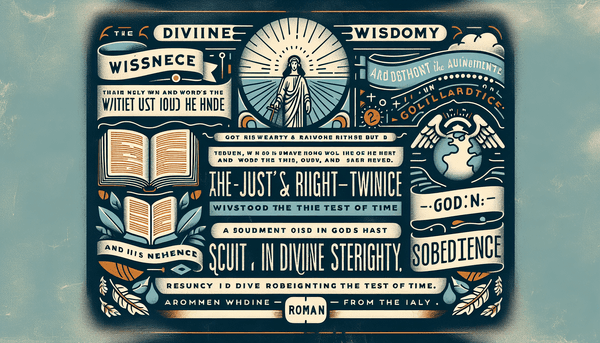Love and Unity in Diverse Faith Relationships
Jesus' command to 'Love one another. As I have loved you, so you must love one another' (John 13:34-35) serves as a cornerstone for relationships transcending different faith backgrounds. This divine instruction not only calls us to love but to foster unity in our diversity. It is a testament to the belief that love can build bridges between distinct traditions and cultures. By honoring one another above ourselves (Romans 12:10) and striving for peace (Ephesians 4:3), we can create a harmonious bond that reflects the deep love that covers a multitude of differences (1 Peter 4:8). In this pursuit, we wear love as the perfect bond of unity (Colossians 3:14), remembering that among faith, hope, and love, the greatest is love (1 Corinthians 13:13).
Spiritual Growth Through Scripture
As we trace the origins of our beliefs and the universe itself, Genesis serves as the starting point, revealing the power and purpose behind our creation (Genesis 1:1). In times of trouble and uncertainty, the Psalms offer solace, reminding us that even when we walk through the darkest valleys, we need not fear, for God is with us (Psalm 23:4). The Gospels present the teachings of Jesus, illuminating our path as believers and providing a model for living out our faith in the world (Matthew 5:14-16). From the beginning, the Word was with God, and through it, we draw closer to Him (John 1:1), applying the golden rule of treating others as we wish to be treated ourselves (Luke 6:31).
Conclusion
In conclusion, the journey of love between individuals from different religious backgrounds is a testament to the ability of faith to unite rather than divide. This article has explored the essence of love and unity as foundational to such relationships, emphasizing the role of open dialogue and the wisdom found in scripture. As we seek to navigate these relationships, let us remember to approach each other with a spirit of love and respect, drawing from the Bible's guidance to find common ground. May we always be mindful of the strength and beauty that can emerge from the rich tapestry of our diverse faith experiences.
FAQ
Q: Is it important for believers to have the same faith in a relationship?
A: While it is beneficial for couples to share core beliefs and values, the Bible emphasizes the importance of love and unity. Paul advises believers in 2 Corinthians 6:14 to not be yoked with unbelievers, encouraging relationships founded on shared faith and values.
Q: How can we approach conversations about faith with our partner?
A: Conversations about faith should be approached with empathy, respect, and a genuine desire to understand each other's perspectives. Sharing beliefs openly and listening with humility fosters deeper mutual understanding (James 1:19).
Q: Can love overcome differences in church background?
A: Yes, love can overcome differences in church background. Jesus' command to love one another (John 13:34-35) serves as a reminder that love is a powerful unifying force in relationships.
Q: Should we seek counsel when in a relationship with someone from a different church?
A: Seeking counsel from spiritual leaders and praying for wisdom can be beneficial in understanding and navigating differences in church backgrounds (Proverbs 3:5-6).






